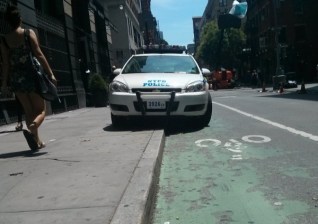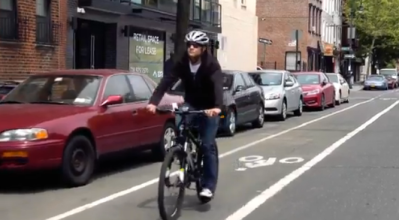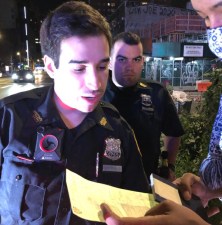NYPD Recommended a Mandatory Helmet Law in 2011
Three years ago, NYPD recommended a mandatory helmet law for all cyclists. While the proposal gained traction among some elected officials, it did not receive support from the Bloomberg administration. The de Blasio administration said yesterday that it won’t back a mandatory helmet law, either. While a helmet law isn’t on the agenda now, it’s a troubling sign that NYPD was so recently in favor of a policy with no proven safety benefit but plenty of potential to discourage cycling.

NYPD Chief of Transportation Thomas Chan revealed the 2011 helmet law plan at a Vision Zero symposium hosted by Columbia University’s Mailman School of Public Health yesterday, and the information was confirmed by a City Hall spokesperson. Other remarks Chan made at the event indicate a disturbing willingness to blame cyclists for getting injured or killed in traffic.
The Vision Zero event featured public health researchers as well as city and federal officials. Outside of Chan’s comments, helmets were discussed only once during the event — a brief mention in discussion of a youth cycling survey, according to notes provided by the Mailman School’s communications department [PDF].
No city where cycling is widespread has improved bike safety with a mandatory helmet law. By sending the message that cycling is an inherently dangerous activity, helmet laws have been shown to discourage people from riding bikes. This puts a damper on the “safety in numbers” effect — the link between higher cycling rates and lower injury rates that researchers attribute to motorists becoming acclimated to cyclists on the street. The net effect is that mandatory helmet laws don’t make biking safer.
Helmet laws also distract from the more important street design and enforcement efforts that make a real dent in traffic violence. It’s telling that helmets are not required in any of the European cities that have been most successful at both encouraging more cycling and reducing traffic injury rates. Closer to home, helmet laws have not proven effective at reducing injury rates in Canada.
The ample evidence that helmet mandates are at odds with the growth of low-risk cycling didn’t stop NYPD’s legislative affairs unit from recommending a helmet law in 2011. Helmets are already required in New York for children age 13 and younger; the police wanted to expand that requirement to all bike riders. The next year, Council Member David Greenfield proposed a mandatory helmet law. Comptroller John Liu followed suit in 2013 with a recommendation to require helmets for bike-share users.
While none of those proposals went anywhere, the fact that NYPD was pursuing a discredited approach to public safety so recently raises questions about whether Vision Zero is only a skin-deep policy at the department. Has NYPD devoted any resources to researching how other police departments have successfully driven down bicyclist injury and fatality rates? Can the department competently safeguard New Yorkers who bike?
Other remarks from Chan yesterday raise more red flags. He said that bicyclists contribute to 74 percent of bike crashes and that 97 percent of cyclists who died in 2004 weren’t wearing helmets. Streetsblog sent multiple requests to NYPD asking where Chan got this data and to clarify the department’s position on helmet laws. When I called to follow up, a spokesperson said the department is “unable to accommodate your request at this time.”



